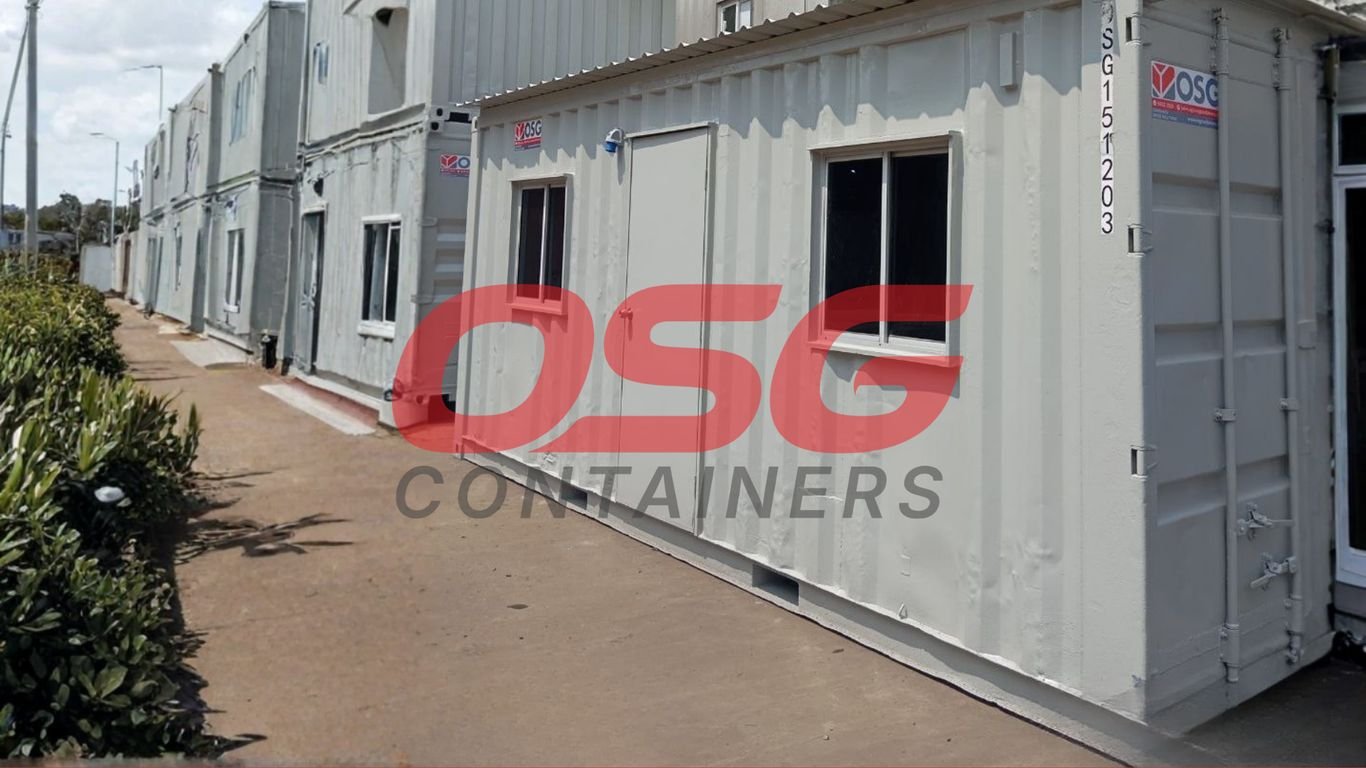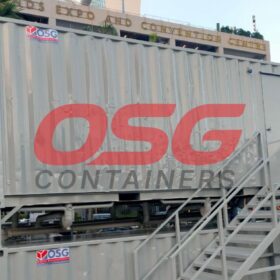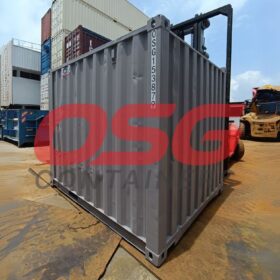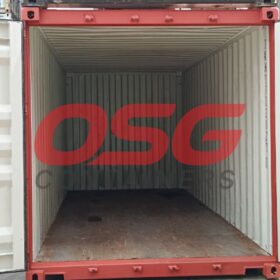Looking for a workspace that can keep up with your business? Office containers for rent might be the answer. These aren’t just old shipping boxes; they’re becoming popular for all sorts of work needs. They’re tough, they can go almost anywhere, and you can set them up pretty fast. Let’s check out why these adaptable spaces are a smart move for many companies today.
Key Takeaways
- Office containers for rent offer flexible workspace solutions that can be moved as your business needs change.
- They are a budget-friendly alternative to traditional office spaces, saving money on construction and long-term leases.
- These containers are highly adaptable, suitable for temporary project offices, remote work hubs, pop-up shops, and business expansion.
- Available in various sizes like 20-foot and 40-foot, with options for enhanced features, they can be customized to fit specific requirements.
- Setting up an office container is typically faster than traditional construction, and they can be equipped with necessary utilities and amenities.
The Versatility of Office Containers for Rent
Office containers, often called conex boxes, are surprisingly adaptable. They’re not just for shipping goods anymore; they’ve become a go-to for businesses needing flexible workspaces. Think about it – you can set up an office almost anywhere, and when you’re done, you can move it. It’s a pretty neat solution for a lot of different situations.
Temporary Offices for Projects and Events
Got a big construction project or a special event coming up? Instead of trying to find and rent a traditional office space that might be miles away, a container office can be set up right on-site. This means your team has a convenient place to work, hold meetings, and manage operations without losing valuable time commuting. They’re quick to deploy, giving you a functional workspace exactly when and where you need it, even if it’s just for a few weeks or months. This is way easier than dealing with long-term leases for something temporary.
Remote Work Hubs for Distributed Teams
With more people working from home, companies are finding their teams are spread out. Office containers can be used to create small, localized work hubs in different neighborhoods. These can offer a quiet space away from home distractions, giving employees a dedicated spot to focus. It’s a way to support remote workers without them having to travel far, and it can help maintain a sense of team connection even when people aren’t in the same building. Some specialized containers, like those that might have been used for reefer cargo, can even be adapted for climate-controlled environments if needed.
Pop-Up Shops for Retail Flexibility
Retailers are always looking for ways to test new markets or reach customers at festivals and events. A container office can easily be converted into a pop-up shop. They’re eye-catching and can be set up quickly in high-traffic areas. This allows businesses to experiment with new locations or sell products at temporary venues without the commitment of a permanent storefront. It’s a great way to be agile in the retail world.
Workspace Expansion for Growing Businesses
When your business starts to grow, you might find yourself running out of space. Moving to a new, larger building can be expensive and disruptive. Renting an office container provides an immediate solution for extra office space. You can add it to your existing site, giving your team more room to work without a major overhaul. It’s a practical way to scale up your operations as needed.
The adaptability of these containers means businesses can respond quickly to changing needs, whether it’s for a short-term project or long-term growth.
Here’s a quick look at how they stack up:
- Project Sites: Immediate on-site office presence.
- Event Management: Centralized command center.
- Retail: Temporary sales points.
- Team Support: Localized co-working spots.
- Growth: Quick addition of office square footage.
Advantages of Choosing Office Containers
So, you’re thinking about office containers, huh? They’re really shaking things up in the workspace world, and for good reason. These aren’t just old metal boxes; they’re smart, adaptable solutions for modern business. Let’s break down why they make so much sense.
Cost-Effective Alternative to Traditional Spaces
Forget about those sky-high rents and long-term leases for a moment. Renting or buying an office container is often way cheaper than setting up a traditional office. You’re not paying for prime real estate in the same way, and the initial setup costs are usually much lower. Think about it: you get a functional workspace without the massive upfront investment or the ongoing burden of property taxes and extensive maintenance.
Mobility and Ease of Relocation
This is a big one. Need to move your office for a new project site? Or maybe your business is expanding and needs to be closer to a different client base? With a container office, you can actually pick it up and move it. It’s like having a portable office that goes where you go. This flexibility is a game-changer for businesses that operate on the move or anticipate changes in their location needs. It means less downtime and less hassle when it’s time to pack up and resettle.
Sustainable and Eco-Friendly Solution
Repurposing shipping containers is a fantastic way to be kinder to the planet. Instead of building something new from scratch, you’re giving a used container a second life. This reduces waste and cuts down on the resources needed for new construction. It’s a choice that aligns with growing environmental awareness and can even be a selling point for your business.
Customizable to Meet Specific Business Needs
Don’t let the simple exterior fool you. These containers can be outfitted to be exactly what you need. We’re talking about adding insulation, electricity, plumbing, air conditioning, and even custom interior layouts. You can design a space that fits your team’s workflow, whether you need private offices, open collaborative areas, or a mix of both. It’s about creating a functional and comfortable environment tailored precisely to how your business operates.
The adaptability of these units means you’re not locked into a rigid structure. You can modify them as your needs evolve, adding or changing features to keep your workspace efficient and productive.
Here’s a quick look at how they stack up:
- Lower upfront costs: Significantly less than traditional construction or long-term leases.
- Flexibility: Easily moved to new locations as business demands change.
- Environmental benefit: Repurposing reduces waste and resource consumption.
- Tailored design: Can be modified to include all necessary utilities and interior layouts.
Practical Applications of Conex Box Offices
Conex box offices, which are basically repurposed shipping containers, have become a really popular choice for businesses needing flexible workspace. They’re not just for storage anymore; people are getting creative with them. These units offer a straightforward way to set up shop almost anywhere.
Think about it: you need a place to manage a construction site, or maybe you’re running a seasonal business and need a temporary storefront. Instead of dealing with the hassle and cost of traditional buildings, a Conex box office can be the answer. They’re sturdy, secure, and can be set up pretty quickly.
On-Site Project Management Offices
For construction sites or any project that’s happening away from your main office, having a dedicated space on location is super helpful. A Conex box office can be set up right there, giving your project managers a place to work, hold meetings, and keep all the important documents secure. It cuts down on travel time and keeps everyone connected to the project.
- Security: Keep plans, equipment, and sensitive documents safe from the elements and unauthorized access.
- Convenience: Located directly on the job site, saving valuable time.
- Comfort: Can be outfitted with heating, cooling, and basic amenities for a productive work environment.
Secure Storage and Workspace Combinations
Sometimes, you need both office space and secure storage. A Conex box office can be configured to offer both. You might have one section set up as a small office for your team, and the other part used for storing tools, materials, or inventory. This is great for businesses that operate out of a single, mobile unit.
| Area Type | Purpose |
|---|---|
| Office | Desk space, computer setup, meeting area |
| Storage | Tools, materials, inventory, equipment |
Flexible Retail and Service Outlets
Pop-up shops, temporary kiosks, or mobile service centers are perfect candidates for Conex box offices. They allow businesses to test new markets, serve customers at events, or offer services in areas where a permanent location isn’t feasible or cost-effective. Setting up a retail space or a service counter in a Conex box is much faster and cheaper than building a temporary structure.
These adaptable units can be transformed into anything from a trendy boutique to a functional service point, allowing businesses to be agile and responsive to market demands without a huge upfront investment.
It’s all about making your business work for you, and these containers really let you do that. They’re tough, they can be made to look good, and they go where you need them to go.
Exploring Different Office Container Options
When you’re looking into renting an office container, it’s not a one-size-fits-all situation. Just like picking out a regular office, there are different types and sizes to consider, and each has its own perks. The key is to match the container type to what you actually need it for. Think about how much space you need, what you’ll be doing in there, and if you need anything extra like more headroom.
Standard Dry Van Containers for Basic Needs
These are your workhorses, the most common type of shipping container you’ll see. They’re built tough and are great for a lot of different uses. You can get them in standard sizes, like 20-foot or 40-foot lengths. They’re pretty straightforward – a solid box with doors at one end. If you just need a simple, secure space to get work done, maybe for a small team or as a site office, a standard dry van is usually a solid, budget-friendly choice. They’re easy to find and modify for basic office setups.
High Cube Containers for Enhanced Vertical Space
Now, if you’re a bit taller, or maybe you just like having more room to breathe, a high cube container is worth a look. They’re basically the same as standard containers, but they’re about a foot taller. This extra height makes a surprising difference, especially if you plan on doing a lot of standing, using tall equipment, or just want a less cramped feel. It’s like getting a bit of extra square footage without actually increasing the footprint of the container itself. This can be a game-changer for making a small space feel much more open and functional.
Specialty Containers for Unique Requirements
Sometimes, a standard box just won’t cut it. That’s where specialty containers come in. These are less common but can be super useful for specific needs. Think about open-side containers, which have doors that open up the entire side of the unit, perfect for a retail pop-up or a workshop where you need easy access. Or maybe a tunnel container, which has doors on both ends, making it easy to pass things through or create a drive-through setup. These often cost a bit more, but if they solve a particular problem for your business, they can be well worth the investment. They really show how adaptable these containers can be.
Choosing the right container type is about more than just size; it’s about how the container’s design will support your daily operations and future needs. Don’t overlook the details that can make a big difference in how comfortable and productive your workspace is.
Available Sizes for Office Containers for Rent
When you’re looking at renting an office container, size really matters. You don’t want something too cramped, but you also don’t want to pay for space you’ll never use. Luckily, there are a few standard sizes that work for most businesses, giving you options to fit your specific needs and budget. The most common sizes are based on standard shipping container dimensions, making them familiar and easy to plan for.
Compact 20-Foot Office Solutions
The 20-foot office container is a popular choice for smaller teams or those who need a focused workspace. It offers a good amount of room without taking up too much real estate on your site. Think of it as a cozy, efficient office that can be set up almost anywhere.
- Ideal for: Site supervisors, small project offices, or as a temporary sales booth.
- Space: Typically provides around 160 square feet of usable area.
- Features: Can often be outfitted with basic amenities like lighting, heating, and cooling.
Spacious 40-Foot Office Configurations
If you need more room to spread out, a cont 40 feet office container is likely your best bet. This size doubles the floor space of the 20-foot option, giving you plenty of room for multiple workstations, meeting areas, or even storage alongside your office setup. The 40 hq (high cube) version offers even more vertical space, which can make a big difference in how open and comfortable the interior feels.
- Ideal for: Larger project teams, mobile command centers, or businesses needing both office and secure storage.
- Space: Offers approximately 320 square feet of space.
- Consider the 40′ High Cube: For added headroom and a less confined feel, especially if you plan on installing shelving or need extra clearance.
Elite Options with Enhanced Features
Beyond the standard sizes, many rental companies offer ‘elite’ versions of their containers. These often come with upgraded finishes, better insulation, and sometimes even built-in restrooms. They’re designed to provide a more comfortable and professional environment right out of the box, reducing the need for extensive customization.
Choosing the right size isn’t just about square footage; it’s about how the space will be used day-to-day. Think about the number of people who will occupy it, the type of work being done, and any specific equipment or furniture you’ll need to accommodate. A little planning upfront can save a lot of hassle later on.
Enhancing Your Container Office Experience
So, you’ve got your office container, maybe a standard 20-foot or a more spacious 40-foot model. That’s a great start! But to really make it a place where work happens smoothly, you’ll want to think about a few extras. It’s not just about having walls; it’s about making those walls work for you. Adding the right utilities and amenities can transform a basic container into a fully functional workspace.
Adding Essential Utilities and Amenities
Getting power, water, and climate control sorted is step one. You don’t want to be stuck in a hot box in the summer or freezing in the winter, right? Most container rental companies can help set these up. Think about:
- Electricity: For lights, computers, and charging your phone. This usually involves running power lines or setting up a generator.
- Climate Control: Air conditioning and heating are a must for comfort and productivity. Look into units that fit the container size.
- Plumbing: If you need a restroom or a small kitchenette, plumbing hookups are possible, though they might add complexity and cost.
- Internet/Connectivity: Reliable Wi-Fi is non-negotiable these days. Consider satellite internet or ensuring a good connection point if you’re near a main building.
Incorporating Furniture and Office Supplies
Once the basics are covered, it’s time to furnish the space. What you need will depend on how you plan to use the container. A simple desk and chair might be enough for one person, while a team might need more.
Here are some common items to consider:
- Desks and Chairs: Ergonomic options are best for long workdays.
- Storage Solutions: Shelving units, filing cabinets, or even wall-mounted organizers can keep things tidy.
- Lighting: Beyond basic overhead lights, task lighting can be helpful.
- Office Supplies: Pens, paper, staplers – the usual suspects.
Security Features for Peace of Mind
These container sg units are often used for valuable equipment or sensitive documents, so security is a big deal. Most rentals come with sturdy, lockable doors, but you might want to add more.
- High-Security Locks: Upgrade from standard padlocks to more robust locking mechanisms.
- Alarm Systems: Motion detectors or door/window sensors can provide an extra layer of security.
- Surveillance: While not always practical for a single container, consider if external cameras are needed for the area.
Making your container office comfortable and secure is key to making it a productive place. It’s about creating a workspace that feels permanent, even if the structure itself is temporary and mobile. Don’t forget to check local regulations regarding utilities and placement, as these can vary.
| Feature | Standard Setup | Enhanced Setup | Notes |
|---|---|---|---|
| Electricity | Basic Outlet | Multiple Outlets, Dedicated Circuits | For computers, lighting, and appliances |
| Climate Control | Basic Fan | AC/Heating Unit | Essential for comfort |
| Internet | None | Wi-Fi Router | Requires external connection |
| Security | Standard Lock | High-Security Lock | For added protection |
Wrapping It Up
So, if you’re looking for a way to get more office space without all the hassle of building or moving, these container offices are definitely worth a look. They’re pretty adaptable, meaning you can use them for all sorts of things, from a quick spot for a construction project to a place for your team to work when you’re not in the main office. Plus, they’re not a bad option for your wallet and are better for the planet since they reuse old shipping containers. It’s a smart move for businesses that need to be flexible and can change things up as they grow or as projects come and go. Think about it – you can get a workspace set up pretty fast and make it your own. It’s a modern way to handle your office needs.
Frequently Asked Questions
What exactly are office containers, and why are they a good idea?
Office containers, also known as Conex box offices, are basically old shipping containers that have been changed into usable workspaces. They’re a smart choice because they’re cheaper than building a regular office, and you can move them around easily. Think of them as flexible offices that can go where your business needs them.
Can I really move these office containers easily?
Yes, that’s one of the best parts! Because they’re built from shipping containers, they’re designed to be moved. If your project changes location or your business needs to shift, you can pick up your office container and take it with you. It’s like having a portable office that adapts to your business.
Are office containers good for the environment?
Definitely! Using old shipping containers means you’re recycling and reducing waste. It’s a greener way to get office space compared to using new materials for construction. So, you’re helping the planet while setting up your business.
How much space do these containers offer, and what sizes are there?
They come in different sizes, like 20-foot ones which are about 160 square feet, and 40-foot ones that give you more room, around 320 square feet. There are also ‘Elite’ versions that might have extra features like a restroom, offering more comfort and convenience.
Can I make the office container look and feel like my own business space?
Absolutely! These containers are super customizable. You can add things like electricity, heating, and cooling. Plus, you can decorate them with your company colors, add furniture, and arrange the space to make it a comfortable and productive place that really shows off your brand.
What are some common ways businesses use these office containers?
Businesses use them for all sorts of things! They’re great for temporary offices on construction sites, as pop-up shops for events or festivals, or even as remote work hubs for teams that don’t always work from a central office. They’re also a fantastic solution for businesses that are growing and need a bit more space without the hassle of moving or building.
 Singapore
Singapore Australia
Australia Indonesia
Indonesia Japan
Japan Malaysia
Malaysia New Zealand
New Zealand Philippines
Philippines South Korea
South Korea Taiwan
Taiwan Thailand
Thailand VIETNAM
VIETNAM




